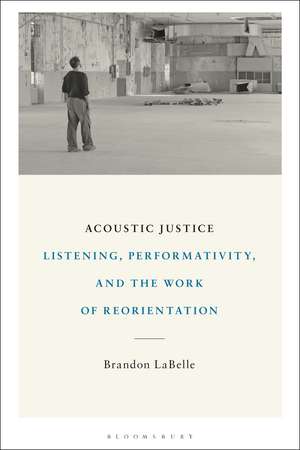Acoustic Justice: Listening, Performativity, and the Work of Reorientation
Autor Brandon LaBelleen Limba Engleză Paperback – 13 ian 2021
| Toate formatele și edițiile | Preț | Express |
|---|---|---|
| Paperback (1) | 160.71 lei 3-5 săpt. | +29.79 lei 7-13 zile |
| Bloomsbury Publishing – 13 ian 2021 | 160.71 lei 3-5 săpt. | +29.79 lei 7-13 zile |
| Hardback (1) | 510.68 lei 6-8 săpt. | |
| Bloomsbury Publishing – 13 ian 2021 | 510.68 lei 6-8 săpt. |
Preț: 160.71 lei
Preț vechi: 174.03 lei
-8% Nou
Puncte Express: 241
Preț estimativ în valută:
30.76€ • 32.07$ • 25.56£
30.76€ • 32.07$ • 25.56£
Carte disponibilă
Livrare economică 27 februarie-13 martie
Livrare express 13-19 februarie pentru 39.78 lei
Preluare comenzi: 021 569.72.76
Specificații
ISBN-13: 9781501368219
ISBN-10: 1501368214
Pagini: 264
Dimensiuni: 152 x 229 x 22 mm
Greutate: 0.4 kg
Editura: Bloomsbury Publishing
Colecția Bloomsbury Academic
Locul publicării:New York, United States
ISBN-10: 1501368214
Pagini: 264
Dimensiuni: 152 x 229 x 22 mm
Greutate: 0.4 kg
Editura: Bloomsbury Publishing
Colecția Bloomsbury Academic
Locul publicării:New York, United States
Caracteristici
Brandon LaBelle is both an artist and an academic - his books appeal to scholars and artist practitioners alike. He is the author of several top-selling Bloomsbury sound studies books, including Background Noise (2006; second edition 2015) and Acoustic Territories (2010; second edition 2019).
Notă biografică
Brandon LaBelle is an artist, writer, and theorist working with sound culture, voice, and questions of agency. His books Acoustic Territories, Second Edition (2019), Background Noise, Second Edition (2015), and Lexicon of the Mouth (2014), are all published by Bloomsbury Academic. He is the Editor of Errant Bodies Press, Berlin, and Professor at the Art Academy, University of Bergen, Norway.
Cuprins
1. Holding, Healing, Attending: Towards Collaborative Living2. Acoustic Performativity: Practices of Composition3. Poetic Ecologies: Resonance, Imagination, Repair4. Skin-Work: Queer Acoustics, Borderspaces, Economies of Desire 5. Deaf Attention: Peripheral Visions, Spatial Meanings, Sensory Politics6. Acoustic Support
Recenzii
This is yet another delightful read on sonic agency by Brandon LaBelle, highlighting this time what is at stake when we think of social and political transformation as an acoustic question. In Acoustic Justice, LaBelle takes the readers through thrilling discussions on 'hearing differently,' on 'generous infrastructure' and 'relating otherwise' - all of them involved in reconfiguring our capacity to act politically. LaBelle's unique approach offers insight into the temporal and situational realms of sound and listening that are fleeting yet necessary for any process of reimagining political possibilities. In the world today, marked by intense structural feelings of uncertainty and fragility, his theorizing of an impersonal, distributed, and collaborative political agency is not just refreshing but indeed very much needed. This book resonates across various fields of social sciences and humanities and is an essential reading for those interested in political theory, sound studies, resistance, and affect theory.
Brandon LaBelle's Acoustic Justice makes important contributions to the scholarship on sound, politics and the public sphere. Exploring how listening as a form of attentiveness functions in an arena of sonic agency, LaBelle deftly illustrates how an acoustic justice exercises a democratic collective action. This is a non-state form of democracy with the capacity to bring into being an extrajudicial civic body, one with greater capacity for what he calls 'hearing differently.' Hearing differently accounts for differences in what is or can be heard as a result of silences, gaps, deafnesses, or absences. Offering up acoustics as a metric for both material and social relations, LaBelle dynamically reads the encounter between the organic and built environments as a 'distribution of the heard' invigorating our understanding of the polis as a social acoustic phenomenon.
Labelle is such a playful and expansive thinker. Acoustic Justice draws so much together across art, philosophy, activism, and beyond to sound an urgent intervention in the politics of attention: a commitment both to hearing differently and to hearing difference. This is an account of acoustics unbound from the audible and an account of justice just 'to the side of law,' that migrates in and out of the legal system and insists on the need for a fair hearing 'in the space of the ordinary.'
Brandon LaBelle's Acoustic Justice makes important contributions to the scholarship on sound, politics and the public sphere. Exploring how listening as a form of attentiveness functions in an arena of sonic agency, LaBelle deftly illustrates how an acoustic justice exercises a democratic collective action. This is a non-state form of democracy with the capacity to bring into being an extrajudicial civic body, one with greater capacity for what he calls 'hearing differently.' Hearing differently accounts for differences in what is or can be heard as a result of silences, gaps, deafnesses, or absences. Offering up acoustics as a metric for both material and social relations, LaBelle dynamically reads the encounter between the organic and built environments as a 'distribution of the heard' invigorating our understanding of the polis as a social acoustic phenomenon.
Labelle is such a playful and expansive thinker. Acoustic Justice draws so much together across art, philosophy, activism, and beyond to sound an urgent intervention in the politics of attention: a commitment both to hearing differently and to hearing difference. This is an account of acoustics unbound from the audible and an account of justice just 'to the side of law,' that migrates in and out of the legal system and insists on the need for a fair hearing 'in the space of the ordinary.'
